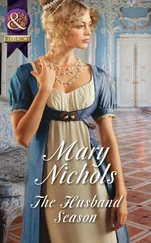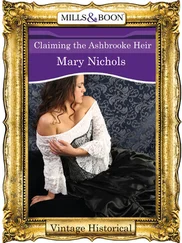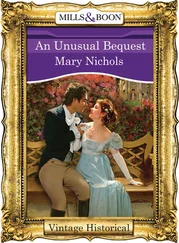‘I am sure he will be happy to accommodate you.’ It was said a little stiffly and Anne realised she had sounded pompous, as if she meant to inspect the place before handing over money; that was not what she intended at all. But before she could put matters right, the woman had excused herself and disappeared.
Anne looked round the room. It was very small and ill furnished with two stuffed chairs whose arms were worn, a table that had once been highly polished but was now stained and dull, some dining chairs and a bookcase. She rose to inspect the titles of the books it contained. The doctor’s taste in reading was broad to say the least. There were medical tomes, philosophical works, books on flora and fauna, tales of the sea, books of poetry and the novels of Sir Walter Scott and even two of Jane Austen’s. She was leafing through a treatise on the efficacy of sea water when the door opened behind her and Justin Tremayne entered.
The books and the room itself faded from her vision as she turned to face him. He had retrieved his coat and put it on, but otherwise he looked just as he had on their first meeting. He was every bit as handsome, his brown eyes just as cold, his jaw just as firm, but his swim seemed to have done him little good; he looked so thin and tired, she had an unexpected urge to mother him, to make him sit down and rest and provide him with nourishing food. His opening words soon disabused her of the idea he was an overgrown child.
‘Madam, I understand you wish to inspect my premises. The two rooms in which I work and the kitchen you have already seen on your earlier visit, and now you have had time to look round the drawing room. There is nothing else but my bedroom. Do you wish to see that? I have to tell you the bed is probably unmade and my garments strewn about—’ He stopped abruptly when he noticed the look of astonishment on her face.
‘Dr Tremayne, you quite mistake the matter. I have no wish to inspect your premises, much less intrude on your domestic arrangements. My interest is purely in the work you do. I admire it greatly and would like to do something to help.’
He bowed, unsmiling. ‘My apologies, ma’am.’
‘Oh, please, do not call me ma’am, it makes me sound so old.’ It was said with a friendly smile that quite unnerved him. He had taken her for an interfering do-gooder who wanted to take over his charitable work and run it for her own gratification, but perhaps he had been wrong.
‘Miss Hemingford, I beg your pardon. Please be seated.’ He picked up a little brass bell and rang it vigorously. ‘I will ask Mrs Armistead to bring us some tea.’
‘Only if you were planning to stop for some yourself. I have no wish to take you from your work.’
‘He needs to take a rest, Miss Hemingford.’ Mrs Armistead had come quickly in answer to the bell and had heard her last remark. ‘I have great trouble making him stop to eat at all.’
‘Tea, please, Janet,’ he said wearily. ‘And some of those little biscuits you made yesterday.’
‘You look tired,’ Anne said, as Mrs Armistead left them. She seated herself in one of the stuffed chairs, knowing he would not sit himself unless she did. ‘Could you not take on some help?’
‘If I could find someone who would work for nothing, I would gladly do so,’ he said, collapsing in a heap in the other chair. ‘But as no one is prepared to do that, I struggle on alone.’
‘Why do you do it?’
‘Now there’s a question!’ His expression was lightened with a genuine smile. ‘I suppose because the work is there, crying out to be done, and someone ought to do it. Brighton is full of wealthy people, aristocrats many of them, able to pay handsomely for medical treatment for whatever ailments their imaginations conjure up, so it attracts the ambitious physician out to make his mark in the world, but they are not the only ones to fall ill. The poor are suffering too. Their ailments, unlike those of the rich, are often the result of too little food and not over-indulgence—’ He stopped, realising he was almost certainly talking to one of the wealthy upper class he was denigrating. ‘I beg your pardon, you do not want to hear this.’
‘Indeed I do.’ He had a mellifluous speaking voice that she could have listened to for hours, whatever he had to say. She ignored the other voice, the one in her head, which told her she should not be holding a conversation with a man, not even a gentleman, alone in his rooms. She was independent enough and old enough to do as she pleased. And though Aunt Bartrum would not approve, Aunt Bartrum need never know.
Mrs Armistead brought in the tea tray and withdrew, saying she had some cleaning up to do in the waiting room, if they were to be ready for the second onslaught in the evening. When she had gone, Anne offered to pour the tea and he nodded agreement.
‘How did you come into this work, Dr Tremayne?’ she asked as she handed him a cup of tea and sat down again with one for herself.
‘Believe it or not, I was a naval surgeon until two years ago when I sustained a wound that forced me to leave the service. I needed something to make me feel wanted and useful and set up practice here in Brighton.’
So that was the reason for the limp, though it did not seem to incapacitate him unduly. ‘Why Brighton?’
He shrugged, unwilling to explain he had simply been wandering up and down the south coast, wanting to be near the sea, but unsure where to settle. He could not go home to Devon; home was where his brother was. And Sophie. He did not want to see them and he was equally sure they did not want to see him.
‘I was visiting the town and saw the need,’ he told Anne. ‘A child, very like little Tildy, had been attacked by a dog on the beach and was badly mauled. Luckily it wasn’t rabid. I did what I could for her and took her to hospital. Her injured face haunted me and when I discovered she had been sent out begging by her parents, I was incensed. I stormed off to visit them, but as soon as I met them, I realised they were not entirely to blame. They were both in the last stages of famine. The father had consumption and could not work and the mother had recently been delivered of another baby, which had not survived, and she had the fever. There were two other children, both younger than the one I had treated. Two older ones were working in service, but they earned little more than their keep and were unable to send home more than coppers. That little girl was the breadwinner for the family.’
‘And so you began a one-man crusade?’
‘You could say that. I did what I could for them and that led to others seeking my help and so I started this practice and, before I had time to blink, I was overwhelmed with patients.’ His smile was no more than a twitch of his lips, as if smiling was something he did not practise very often, but it was an attempt at one and she felt encouraged.
‘Mrs Smith told me you never turned anyone away.’
‘How can I, Miss Hemingford? I am a healer.’
‘And do you rely totally on donations?’
‘I have a naval pension and a small private income, but it is not enough. I beg, Miss Hemingford, that is what I do. I write letters to wealthy people, I write to the newspapers, I ask charitable organisations for donations and, on the few occasions I am called to treat someone who can well afford my services, I charge them an exorbitant fee. So far we have survived, but…’ He shrugged expressively.
She put her teacup on the tray and opened her reticule to withdraw the bag of money she had brought with her. ‘I thought you would prefer cash to a bill,’ she said, laying it on the table.
‘Thank you,’ he said, making no move to pick it up and see how much it contained. It was acceptable, whatever the amount. ‘You are very kind.’
Читать дальше












